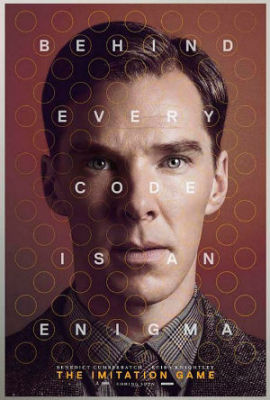Film Reviews

The Imitation Game
Genre: Drama
Director: Morten Tyldum
Cast: Benedict Cumberbatch, Keira Knightley
MPAA-Rating: PG-13
Release Date: December 12th, 2014
The Imitation Game is the rare film that offers an off-putting protagonist and dares the audience not to like him. Benedict Cumberbatch stars as Alan Turing in this true story about a brilliant mathematician who seeks to crack the German enigma code in the midst of World War II. Like Sherlock Holmes on the British series that Cumberbath stars in and Sheldon Cooper on The Big Bang Theory, no rx Turing is a science-driven, recipe logic-loving braniac who can’t help but alienate everyone he meets.
A simple lunch invitation isn’t easily deciphered by Turing, who parses every word as if being exact is the same as being smart. It isn’t and it’s no wonder that the team of scientists he’s partnered with don’t appreciate his genius. That team is charged with deciphering the coded military messages the Germans are passing to one another during the war.
Graham Moore, adapting the book Alan Turing: The Enigma to the big screen here, is never hesitant in presenting Turing as a man that most people would dislike in ordinary life. How frustrating it would be to live with or even work with a person who doesn’t understand sarcasm, can’t tell a good joke and finds it hard to hold a reasonable conversation. The British team that Commandar Deniston (Charles Dance) builds to break the code doesn’t like Turing and neither will some members of the audience, who will find his personality grating at first.
Fortunately, director Morten Tyldum knows how to solve the puzzle of making an unlikeable figure profoundly likeable. He does it partly by showing so many other characters disliking and mocking Turing (especially in his younger days, when Turing was bullied by his vicious schoolmates). That helps build our sympathies for him.
An often-repeated line in the screenplay notes that “Sometimes it’s the very people who no one imagines anything of that do the things that no one can imagine.” And Turing, despite his obvious intellectual prowess and cockiness, is the type of figure that can easily be written off because of his personality alone. He shouldn’t be.
If The Imitation Game was simply a good historical drama, the story would’ve centered solely around the code-breaking task. Fortunately, Moore and Tyldum are aiming for something much higher here. They present Turing’s story not simply as a historical retrospective but as a painful drama about a brilliant man who had a major secret to hide: Turing was gay. In a society where homosexuality was illegal, that fact alone would’ve prevented the mathematician from serving on such a project (and could’ve put him in prison).
In showing that aspect of him and slowly revealing what happened when Turing’s sexuality was eventually outed, the filmmakers present a story that is both historical and fiercely contemporary. There are a few self-congratulatory moments when the script feels too obvious unfortunately. One such moment occurs in regards to an upcoming German attack that will deeply affect one of the men working on Turing’s project.
But aside from a few moments like that, The Imitation Game relies solely on its narrative prowess and strong script to tell its story. Cumberbatch, in his Sherlock-type role, does strong work here as does Keira Knightley— who plays the only female on the secretive team and Turing’s greatest advocate.
The Imitation Game is a dramatic film that comes together well at the end, showing Turing’s genius and why “genius” alone wasn’t enough to save him from facing an ugly justice system more interested in his sexuality than in his patriotism.
Review by: John Hanlon












